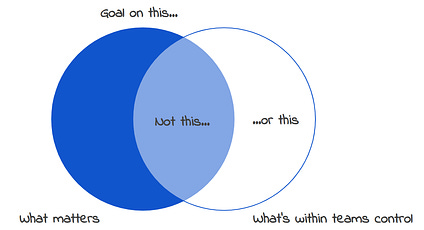Goal on What Matters. Even if Its Not Fully Within the Teams Control.
Product teams insisting they are only to be held accountable for goals fully within their control has become one of my biggest pet peeves. The argument goes that it’s unfair to judge a team on factors external to their work.
However, if you narrow the target to what is within a product team’s control, you usually end up with an esoteric metric rarely understood outside of the team, nearly guaranteed to be disconnected from business outcomes.
A flavor of this failure pattern is tying product goals to A/B test results. In theory, A/B test results yield the most accurate impact measurement of product changes. In practice, setting goals based on A/B tests slows overall velocity, as teams are incentivized to set up tests purely for the sake of attribution and run obvious improvements as tests instead of full ramps.
I used to buy into the argument and I’ve set my share of esoteric product goals, but I stopped after seeing product teams celebrate narrow metric wins while the business struggled or neglected ramping successful tests after taking the a/b test win.
Now, I always push product teams to be accountable for full business outcomes, even where control is partial. I remind teams that the same standard holds for all other functions:
-
Sales doesn’t fully control closed won revenue.
-
Marketing doesn’t fully control ROAS.
-
Talent acquisition doesn’t fully control hiring velocity.
-
Etc.
Clear incentives and goals are critical for teams to stay focused. Eliminate one source of distraction by aligning goals to the outcomes that matter to business.

